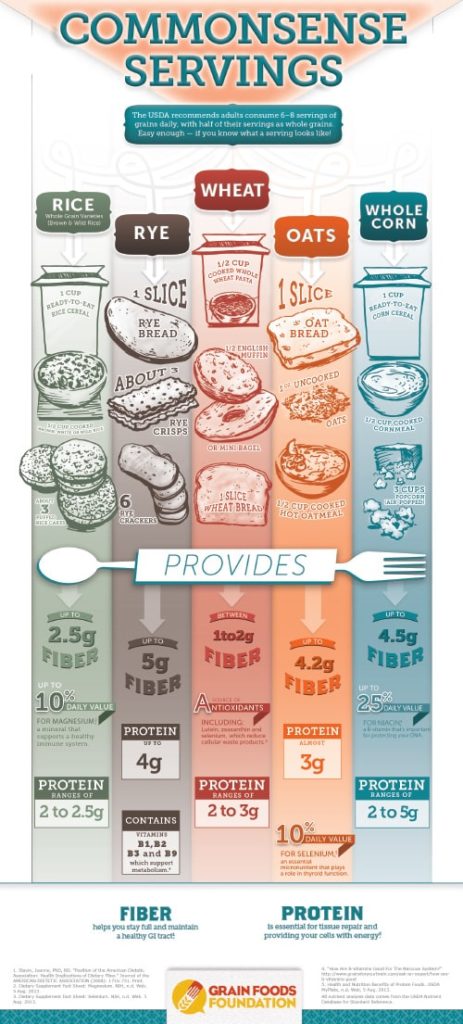 The USDA recommends adults consume six to eight servings of grains daily, with half of their servings as whole grains. This seems easy enough unless you don’t know what a serving looks like. When it comes to whole grain varieties, eat one cup of ready-to-eat rice cereal, ½ cup of cooked brown, white or wild rice or about three puffed rice cakes. A serving of these whole grain foods will provide you up to 2.5 grams of fiber, up to 10% of your daily value of magnesium, a mineral that supports a healthy immune system and protein ranges of 2-2.5 grams.
The USDA recommends adults consume six to eight servings of grains daily, with half of their servings as whole grains. This seems easy enough unless you don’t know what a serving looks like. When it comes to whole grain varieties, eat one cup of ready-to-eat rice cereal, ½ cup of cooked brown, white or wild rice or about three puffed rice cakes. A serving of these whole grain foods will provide you up to 2.5 grams of fiber, up to 10% of your daily value of magnesium, a mineral that supports a healthy immune system and protein ranges of 2-2.5 grams.
If you are eating rye, the recommended serving sizes include one slice of rye bread, about three rye crisps, or six rye crackers. If you eat these items, you will get up to five grams of fiber, up to four grams of protein and Vitamin B1, B2, B3 and B9, which support metabolism.
The serving sizes for wheat are as follows: ½ cup of cooked whole wheat pasta, ½ English muffin or mini bagel or 1 slice of wheat bread. You’ll get between 1-2 grams of fiber, 2-3 grams of protein and a great source of antioxidants including lutein, zeaxanthin and selenium which reduces cellular waste products.
If you are eating oats, you should serve yourself one slice of oat bread, one ounce of uncooked oats or a ½ cup cooked hot oatmeal. A serving of oats will provide up to 4.2 grams of fiber, almost three grams of protein, and 10% of the daily value of selenium, an essential micronutrient that plays a role in thyroid function.
Whole corn servings include: one cup ready-to-eat-corn cereal, ½ cup cooked cornmeal or three cups of air-popped popcorn. Any of these food items will get you up to 4.5 grams of fiber, up to 25% of the daily value of niacin, a B-vitamin that’s important for protecting your DNA and around 2-5 grams of protein.
Download this Infographic

